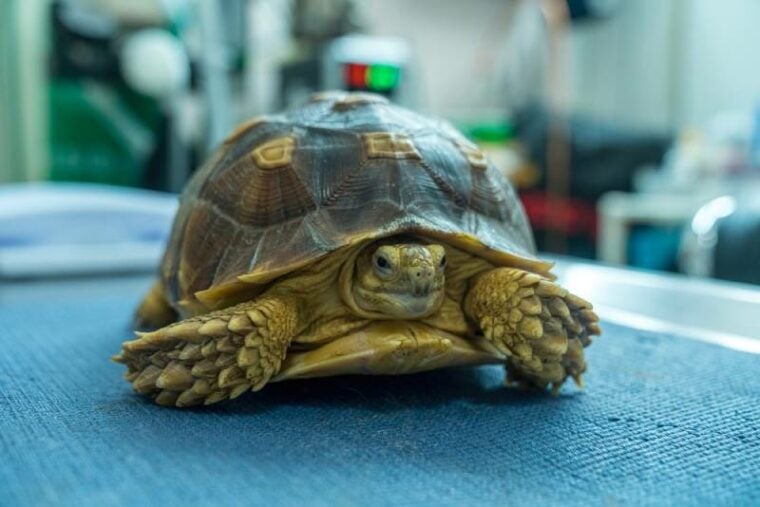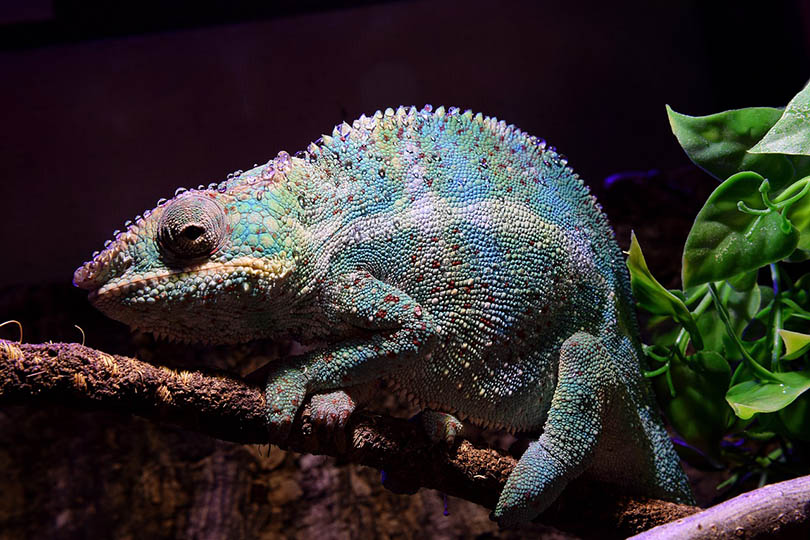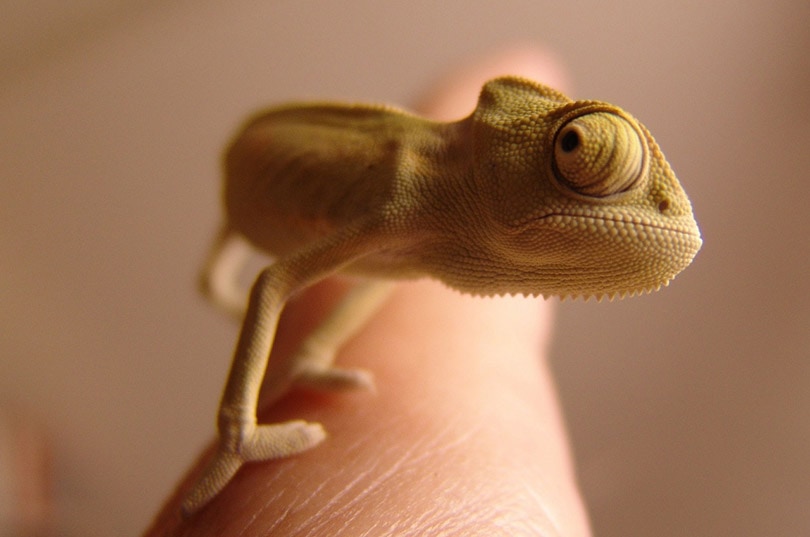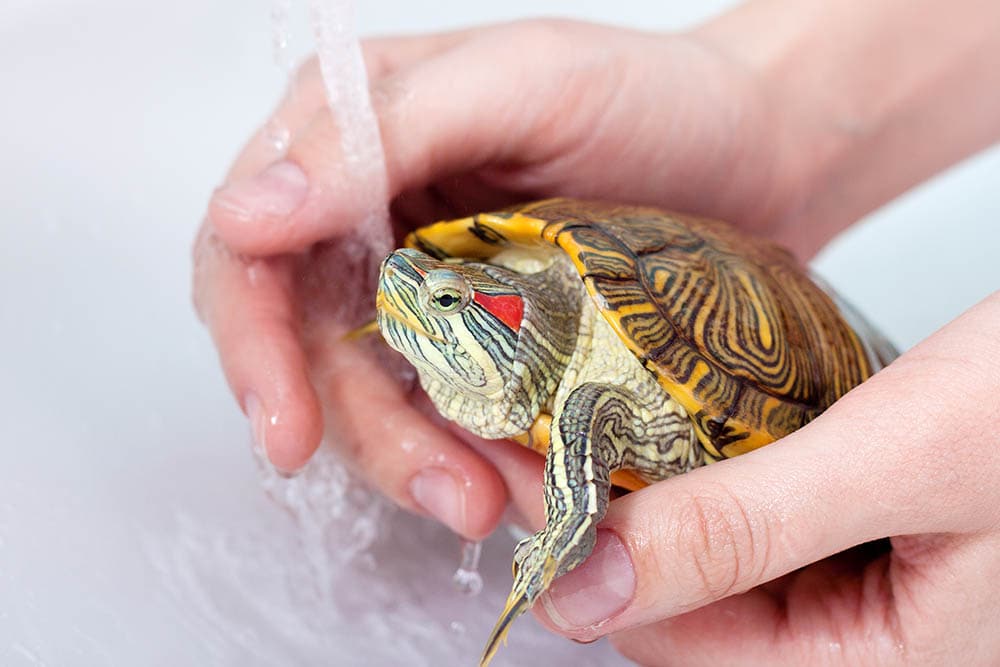
If you have a tortoise, you probably already know they have long lifespans. In fact, depending on the breed, some can live for 150 years. Their long lives often make their owners feel like they’re nearly indestructible. However, knowing the signs that your tortoise might be dying is still extremely important. We’ll give you a few of the most common signs in the guide below.
The 8 Signs a Tortoise Is Dying
1. The Tortoise Shell Looks Abnormal/Damaged
The shell is a huge indicator of your tortoise’s health. If the tortoiseshell is firm and smooth and has no indications that it’s been damaged, your tortoise is healthy. You should also be able to see growth rings between the scutes, which are the individual plates. If these are not present or look abnormal on your tortoise, you may need to be concerned.
It also goes without saying that your pet should have no injuries, damage, or visible cracks in its shell. If you see cracks, it’s best to get your tortoise to a vet right away for treatment.
If your pet has a soft shell, it might be able to be corrected with a different diet and exposure to the sun. Your vet will tell you more when you take the tortoise in for an appointment.
Not only does a crack or damage to the shell suggest blunt force trauma, but it also means that the tortoise could be injured internally. Also, a cracked or fractured shell can allow parasites or infections to thrive and make the tortoise sick.
2. Difficulty Breathing
If your tortoise is healthy, it should take three to four breaths every minute. However, it won’t always be noticeable that your pet is struggling to breathe. You should listen for sounds of wheezing and gasping, as well as try to count the breaths the tortoise takes if you can.
If your tortoise starts extending its neck, as if looking around the room, it usually means it is having problems breathing and can’t expel mucus accumulated in its air passages.
Your vet will handle this issue by giving your tortoise antibiotics and nasal drops. A tortoise with difficulty breathing will eventually stop moving, eating, and drinking, which could be fatal.

3. Sudden Weight Loss
It’s difficult to tell whether a tortoise is losing weight or not because of the shell. You can get a scale and weigh your tortoise weekly to keep up with its weight. If you’re concerned, you can also pick up your pet and feel its weight in your hand.
It’s important to note that the weight of a tortoise is apt to fluctuate especially after brumation, but a sudden drastic drop in weight requires a veterinary examination. A tortoise that is at the right weight should feel solid and heavy when you pick them up. Sudden weight loss can be caused by various issues, including digestive problems and infections.
4. Refusing to Leave its Shell
If your tortoise refuses to leave its shell for quite some time, you should take your pet to the vet. Tortoises that are dying tend to hang their legs out of their shell in their last moments. If your pet is hiding, and it’s not in brumation, it’s hiding for a reason. It could be sick or injured, so you need to try and coax it out of its cage to see if you can spot any visible problems.
If the tortoise doesn’t have any obvious signs of distress, keep an eye on it, and if it doesn’t come out of its shell soon, it’s best to take it to the vet for an examination.

5. Loss of Appetite
Another sign that your pet may be sick or dying is a loss of appetite. Tortoises have two starve days a week and should eat healthy food the other 5 days. It is possible that your tortoise just doesn’t like the food you’re giving it. However, it’s also possible that the environment you have your pet living in is too cold for it to digest its food properly, which makes it stop eating.
Loss of appetite can also be a sign that your tortoise is sick. It could cause constipation or be impacted, which will cause it to stop eating. If you soak your tortoise in a warm bath, it should soften its stool. If the problem persists, it’s best to see a vet.
Make sure you check the tortoise’s stool for parasites, such as intestinal worms, and call your vet immediately if the worms are present. Your vet can prescribe Panacur to treat most worms but will be able to tell you more at your appointment.
6. Discharge from the Eyes or Nose
A sick or dying tortoise often has a discharge from its eyes or nose. A respiratory infection usually causes this and needs to be treated right away. Even if your tortoise seems to be breathing fine through a runny nose, a respiratory infection is dangerous and needs to be treated. If left unchecked, the condition can lead to pneumonia.

7. Refusing to Drink
As with any animal, tortoises must be hydrated to survive. A tortoise will rarely live more than 7 days if it is dehydrated. So, if your pet isn’t drinking and hasn’t drunk anything in 2 days, it’s at risk of severe hydration and needs to be seen by a vet.
This is even worse if the tortoise has a pre-existing condition or is older. Here are a few conditions that dehydration in your tortoise can cause.
You can put your tortoise in lukewarm water with Pedialyte to help it from becoming dehydrated if it’s refusing to drink. However, getting the tortoise to the vet right away is extremely important, as dehydration can be fatal to your reptile friend.
8. Uncharacteristic Aggression
Tortoises will often hiss when they are irritable, but for the most part, you can expect your pet to be even-tempered. A sign that your pet is sick or dying is when it shows uncharacteristic aggression. This can happen during mating season and if their living conditions don’t suit them.
However, if your tortoise suddenly starts biting and headbutting you when you get near it, there could be something wrong, so make an appointment with your vet.

Conclusion
Tortoises are normally even-tempered and tolerant of busy households. However, many tortoise keepers don’t realize when their pets are sick or dying. Their shells hide their bodies and make it challenging to determine if they’ve lost weight, and they don’t cry out when they’re in pain, like some pets. However, if you feed your tortoise a healthy diet and provide a suitable environment, you can tell when its appearance or behavior is off. Your veterinarian can help if you’re ever concerned about how your tortoise acts or looks.
Featured Image Credit: thirawatana phaisalratana, Shutterstock







